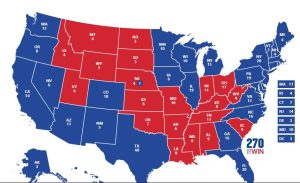Migrants in the US settling in ‘blue’ communities
Migrants arriving in the US are overwhelmingly settling in states and counties that voted Democrat in the last US presidential election, according to an analysis by Bloomberg News says.
As the next US election approaches, immigration will be an important in the campaign, and especially its impact on the US economy, jobs and public services.
Immigration will be an even hotter issue in swing-state cities and towns that are poised to have larger impact on the election, the Bloomberg said.
Former President Trump has put immigration at the centre of his campaign with inaccurate and often debunked narratives about the negative impact of immigration – that they are stealing Americans’ jobs and committing crimes.
The data analysed by Bloomberg had some surprising findings that refute the trajectories of migrants described by the Trump campaign rhetoric.
 Bloomberg News analysed immigration court data obtained by researchers at Syracuse University showing where the 1.8 million asylum seekers and refugees who landed in the US in 2023 took up residence.
Bloomberg News analysed immigration court data obtained by researchers at Syracuse University showing where the 1.8 million asylum seekers and refugees who landed in the US in 2023 took up residence.
In the states that will decide the election, “about 72 per cent of migrants in 2023 went to Biden counties while less than a third went to Trump counties. Counties that voted for Biden four years ago are home to roughly 60 per cent of the overall US population’, the report said.
“Swing states received 12 per cent of all migrants, with most going to blue counties like Philadelphia and Gwinnett, which is outside Atlanta. Migrants are headed to places with growing local economies, bolstering the labour force in places already thriving. In swing states, 85 per cent of migrants settled in places that saw GDP growth from 2019 to 2022,” it said.
Few migrants settled in counties that saw GDP decline, the vast majority of which were won by Donald Trump in 2020 and badly need more workers to stem local economic and population declines, the report revealed.
It said these newcomers are unlikely to become citizens before the election. But their arrival will have an effect on the presidential contest, and their journeys don’t always unfold in the ways partisan campaign cliches suggest.
“In some places, the prevailing politics are in friction with local economic interests. That creates a messaging challenge for both Harris and Trump as they try to win over voters in key states – and a policy conundrum for local leaders looking beyond the election to their communities’ future,” the report said.
“These newcomers are unlikely to become US citizens before the election, so they won’t be casting ballots of their own. But their arrival will nonetheless reverberate in the presidential contest, and their journeys — as seen in one county that is solid Trump country and another that is a Democratic stronghold — don’t always unfold in the ways partisan campaign cliches would suggest,” it said.
See some explanatory Bloomberg graphics: US Election: How Migration in Key States Affects Local Economics (bloomberg.com)












